UN Security Council meets over Iran ballistic missile test
The United States and Iran traded accusations on Tuesday over Tehran's latest ballistic missile test, which the UN Security Council discussed behind closed doors without taking any action.
US Ambassador Nikki Haley called on the UN's most powerful body to unanimously condemn the "provocative missile test" on December 1, calling it "dangerous and concerning, but not surprising".
At issue is Iran's compliance with the Security Council resolution that endorsed the landmark 2015 Iran nuclear agreement with Western powers, which the Trump administration pulled out of in May. A key provision calls on Iran "not to undertake any activity related to ballistic missiles designed to be capable of delivering nuclear weapons" - but it does not explicitly demand that Tehran do so.
The Security Council has been divided since the resolution was adopted over whether the language on ballistic missile launches is permissive or mandatory.
Iran's UN Mission said in a press release on Tuesday that "all ballistic missile related activities of Iran are in full conformity" with the 2015 Security Council resolution and said that "it is the US that is in absolute violation of the very same resolution" for "its unlawful withdrawal" from the nuclear deal.
Britain, France and Germany - the three remaining Western powers still part of the nuclear agreement - had sent a letter to the council, which was circulated Tuesday, saying Iran's earlier launches of Zolfaqar and Qiam short-range ballistic missiles on 30 September and 1 October "are inherently capable of delivering nuclear weapons."
Britain's UN Ambassador Karen Pierce told reporters after the closed council meeting that members expressed "a lot of concern" about the 1 December test launch and stressed that the 2015 resolution doesn't say nuclear weapons must be on the missiles.
She called Iran's actions "inconsistent" with the resolution and "part and parcel of Iran's destabilising activity in the region".
"There is no legitimate reason why Iran should flout the resolution and why their spokesman should pretend that the resolution doesn't call on them not to develop such missiles," Pierce said.
"If you wanted to demonstrate to the international community that you were a responsible member of it and you were genuinely interested in regional peace and security, these are not the sorts of missiles you would be test launching."
Iran's UN Mission said that the country's ballistic missile program is purely defensive and a "deterrent tool against foreign threats" and declared that the country isn't violating the resolution.
"As a conventional defensive capability, Iran's ballistic missile programme is designed to be exclusively capable of delivering conventional warheads and, as a result, none of Iran's ballistic missiles are 'designed to be capable of delivering nuclear weapons,'" the mission said.
"Iran has never sought to acquire nuclear weapons and never will in the future."



